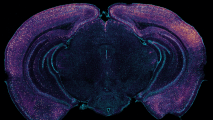A new computerized brain implant can instantly detect pain signals and counteract them, using bursts of pain-relieving stimulation.
The tiny implant is still in its early stages of development, but researchers have shown it to be successful in rodents.
The study: Researchers at NYU Grossman School of Medicine call their brain implant a “blueprint” for implants that treat pain and other disorders like anxiety, panic attacks, and depression.
“This implant offers an effective strategy for pain therapy.”
Jing Wang
In a test on rats, published in Nature Biomedical Engineering, the implant temporarily relieved both acute and chronic pain.
When the implant was turned on, the rodents drew their paws away from a painful stimulus 40% slower than when the implant was turned off. The rats with ongoing pain spent two-thirds more time in a chamber where the computer-controlled implant was turned on, than in a chamber where it was not turned on — suggesting that it effectively lowered pain.
“Our findings show that this implant offers an effective strategy for pain therapy,” said Jing Wang, senior author of the study.
Unlike opioids, it shouldn’t trigger areas of the brain that cause addiction.
How it works: The implant’s brain-computer interface (BCI) works like a “neural bridge” that delivers a message between two brain regions. If it detects pain in one area of the brain, it responds with stimulation that reduces pain in another brain area.
The brain implant creates a real-time neurofeedback loop between an array of electrodes and an “optogenetic” system in two parts of the brain. The electrodes detect the pain signals, while the optogenetic system uses light to stimulate neurons that suppress pain. Working together, the system can quell pain as it occurs.
A step ahead in pain relief: Jing Want, an author of the study, says that because the brain implant specifically focuses on how pain is processed, it shouldn’t trigger areas of the brain that cause addiction, unlike opioids.
Also unlike drugs, the brain implant operates on its own and automatically responds to the level of pain it detects — reducing the risk of overuse, reports New Atlas. The “closed-loop” system means that it can instantly respond to spikes in pain, too, so patients don’t have to suffer while drugs get absorbed into their system.
Why this matters: Chronic pain affects one in four adults. Migraines, a type of chronic pain, are considered one of the most common and disabling neurological problems.
The treatments currently available for pain are often unreliable or come with side effects from nausea to increased risk for stroke. Even over the counter pain medicine can have serious side effects, like risk of liver damage.
Additionally, people with chronic pain can become desensitized to pain killers, which become less effective over time. And, because drugs like opioids impact the reward centers of the brain, they can cause addiction.
Many researchers are looking for new non-drug therapies to treat chronic pain — like green light, gene therapy, and even virtual reality. But this study is the first time that a “closed-loop” BCI has been used to stop pain. While a brain implant might be too invasive for minor chronic pain, with the research potential, it could lead to better, more targeted, medications.
“Our results demonstrate that this device may help researchers better understand how pain works in the brain,” said Qiaosheng Zhang. “Moreover, it may allow us to find non-drug therapies for other neuropsychiatric disorders, such as anxiety, depression, and post-traumatic stress.”
We’d love to hear from you! If you have a comment about this article or if you have a tip for a future Freethink story, please email us at [email protected].






